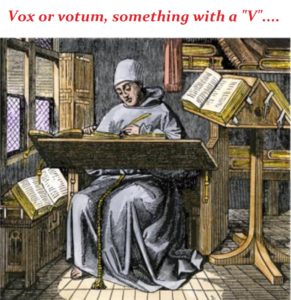The Rite to Vote
Voting has always been an act of faith. In ancient Rome, a votum was a religious vow. If you were underfoot a Carthaginian elephant or had encountered Caligula in one of his zany moods, you could promise the Gods a few sacrificed sheep in exchange for your survival. Those who actually kept their promises were said to be “devout” or “devoted.” By the Middle Ages, Europe’s theology had changed but the definition of votum had not. People were still eager to bargain with Heaven. To avoid the bubonic plague, you too might vow not to beat the serfs for a month.
Votum acquired its political character in 15th century Scotland. That rugged, hardscrabble land fostered an independent, feisty spirit that would not accommodate the king’s attempts to govern. The hapless monarch had only as much power as his quarrelsome nobles begrudged him. To enact any legislation or to organize a raid on England, his majesty had to wheedle a consensus from his lairds and clan chieftains.
 Of course, even a tenuous government like Scotland’s had bureaucrats, and someone was recording the proceedings of the royal council. That scribe wanted a term to describe the machinations of arriving at a political decision. Demonstrating his erudition, he naturally chose a Latin word: votum. Unfortunately, it was the wrong one. The Latin word for vote is suffragium. Perhaps the Scottish bureaucrat thought that “votum” meant voice, which actually is “vox” in Latin. His error became the common term in Scotland.
Of course, even a tenuous government like Scotland’s had bureaucrats, and someone was recording the proceedings of the royal council. That scribe wanted a term to describe the machinations of arriving at a political decision. Demonstrating his erudition, he naturally chose a Latin word: votum. Unfortunately, it was the wrong one. The Latin word for vote is suffragium. Perhaps the Scottish bureaucrat thought that “votum” meant voice, which actually is “vox” in Latin. His error became the common term in Scotland.
In 1603, Queen Elizabeth of England died. Her reign was glorious, but a Virgin Queen is bad for a dynasty. She was succeeded by her cousin James, the King of Scotland. The Stuarts were long used to groveling to nobles, but they were not prepared to negotiate with a Parliament full of commoners. The Stuarts obviously felt that they had more divine rights than the Tudors did. Rather than face the demands and criticism of Parliament, James I decided to avoid it; he simply wouldn’t call it into session. Of course, he couldn’t raise revenues and the Crown verged on bankruptcy, but James was a miser by nature. His son and successor, Charles I, had more expenses-wars, a French wife and all those van Dyke paintings-so he called Parliament and attempted to bully it. If you don’t know the outcome, you could read his autopsy report.
Considering the Stuarts’ hostility to Parliament, it is ironic that the Scots introduced the “vote” to England. In its political context, the word was unknown. (In its religious context, the word had become rather risky since Henry VIII.) The Parliament had been founded in 1265 and, for more than three centuries, this assembly of gentry, clergy and burghers had been using the correct Latin terms for their legislative decisions. The noun was “suffrage”. The verb was “suffragate.” This was not just legal jargon. The words were in the English vernacular. In Shakespeare’s “Titus Andronicus”, the title character addresses the people of Rome, “I ask your voices and your suffrages.”
However, when the English finally heard the word “vote”, they appreciated its succinct brevity. It was easier to say than “suffragate,” a word now mercifully obsolete. The term “suffrage” has survived but with a more limited meaning: the right to vote. A century ago, some justifiably indignant women made excellent use of the word. As for the word “vote”, it is now purely secular. Yet, it still retains some trace of its origins. All too often, the voter is confronted with a choice of idols, each promising miracles.